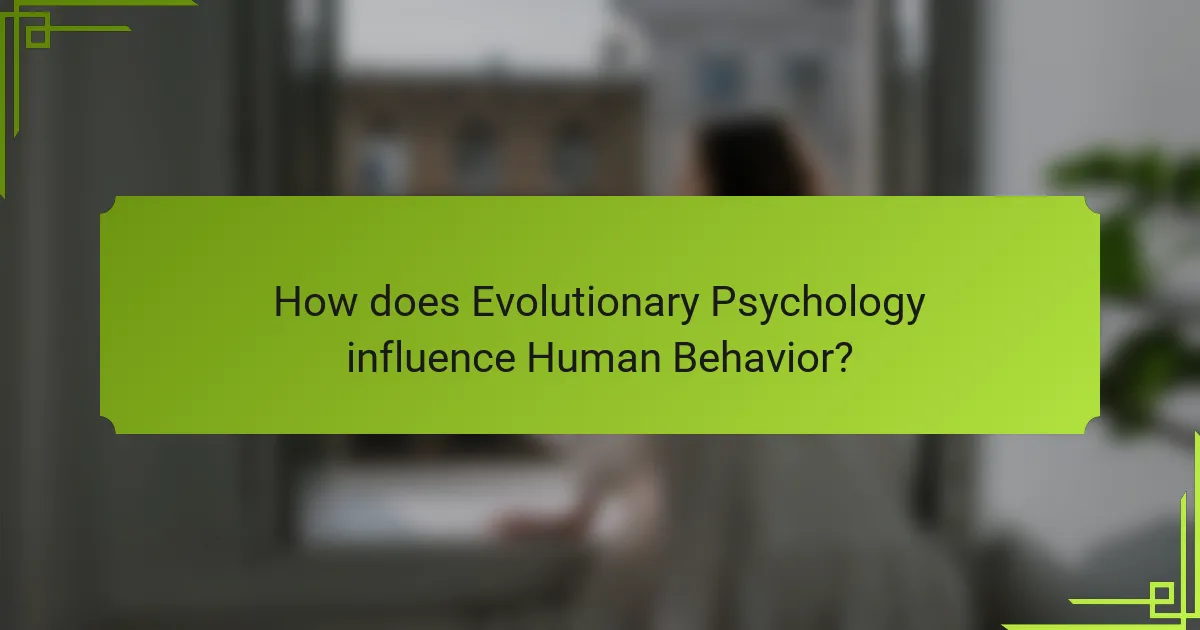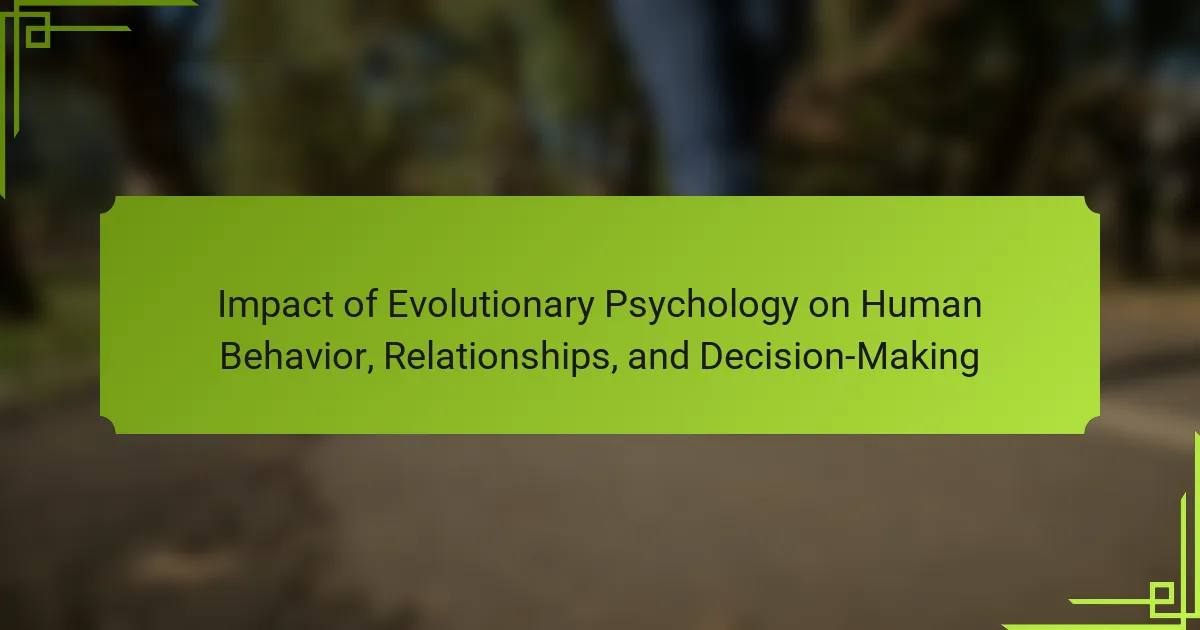Understanding the impact of evolutionary psychology can enhance interpersonal interactions and decision-making strategies. This field reveals how ancestral survival strategies shape modern relationships, mate selection, and social dynamics. It also explores how innate preferences influence choices and conflict resolution. By applying these insights, individuals can improve their personal and professional relationships.

How does Evolutionary Psychology influence Human Behavior?
Evolutionary psychology significantly shapes human behavior by influencing relationships and decision-making processes. It suggests that many behaviors are adaptations to ancestral environments, affecting mate selection, social dynamics, and conflict resolution. For instance, humans often prioritize traits like kindness or resourcefulness in partners, reflecting survival strategies. This perspective reveals how evolutionary pressures can lead to preferences that persist in modern contexts, impacting choices in both personal and professional relationships. Understanding these influences can enhance interpersonal interactions and decision-making strategies.
What are the key principles of Evolutionary Psychology?
Evolutionary psychology posits that human behavior, relationships, and decision-making are shaped by evolutionary pressures. Key principles include the influence of natural selection on psychological traits, the importance of reproductive success in shaping behaviors, and the role of adaptive functions in social interactions. These principles suggest that many aspects of human behavior, such as mate selection and altruism, are rooted in survival and reproductive strategies. Understanding these principles can provide insights into human motivations and social dynamics.
In what ways does Evolutionary Psychology shape our instincts?
Evolutionary psychology significantly influences our instincts by shaping behaviors essential for survival and reproduction. It explains how innate tendencies, such as social bonding and resource allocation, emerge from ancestral environments. For instance, the instinct to form close relationships enhances cooperation and ensures offspring survival. Additionally, evolutionary psychology informs decision-making processes, often prioritizing immediate rewards over long-term consequences, reflecting a survival-oriented mindset. These instincts are rooted in our evolutionary past, making them fundamental to human behavior today.
What role do survival and reproduction play in decision-making?
Survival and reproduction significantly influence decision-making by shaping behaviors that enhance fitness. Evolutionary psychology suggests that choices often reflect ancestral pressures to secure resources, mate selection, and social alliances. These factors drive individuals to prioritize actions that optimize their survival and reproductive success. For instance, risk-averse behavior in uncertain situations may stem from the need to protect oneself and ensure lineage continuity. Understanding these instincts can illuminate contemporary human interactions and choices.
How do social hierarchies affect behavioral patterns?
Social hierarchies significantly influence behavioral patterns by shaping individual roles and interactions within groups. These hierarchies dictate access to resources, social status, and power dynamics, which in turn affect decision-making and relationship formation. For example, individuals in higher social positions often exhibit greater confidence and assertiveness, while those in lower positions may display submissiveness or caution. This dynamic can lead to variations in communication styles and conflict resolution approaches. As a result, understanding these hierarchies is crucial for comprehending human behavior in social contexts.

What are the effects of Evolutionary Psychology on Relationships?
Evolutionary psychology significantly influences relationships by shaping attraction, mate selection, and conflict resolution. It suggests that behaviors are rooted in survival and reproductive strategies. For example, individuals may prioritize traits that signal genetic fitness, such as physical health or social status. As a result, evolutionary principles can explain patterns in partner choice and relationship dynamics. Understanding these effects can enhance communication and compatibility in relationships.
How does mate selection reflect evolutionary principles?
Mate selection illustrates evolutionary principles by demonstrating how individuals prioritize traits that enhance reproductive success. Factors such as physical attractiveness, social status, and genetic compatibility influence mate choices, reflecting natural selection’s role in shaping human behavior. Research shows that these preferences vary across cultures but consistently align with evolutionary strategies aimed at optimizing offspring viability. The concept of sexual selection, a unique attribute of evolutionary psychology, further explains why certain traits are favored in mate selection, emphasizing the adaptive nature of human relationships.
What are the psychological underpinnings of jealousy?
Jealousy stems from evolutionary psychology, serving as a mechanism to protect relationships and resources. It promotes mate guarding and enhances reproductive success. This emotional response can lead to increased vigilance, fostering stronger bonds but may also result in destructive behaviors. Understanding these dynamics helps in navigating human relationships effectively.
How does Evolutionary Psychology explain attachment styles?
Evolutionary psychology explains attachment styles as adaptive behaviors shaped by survival needs. Secure, anxious, and avoidant attachment styles emerge from early bonding experiences, influencing adult relationships. Secure attachment fosters trust and cooperation, while anxious attachment leads to dependency and fear of abandonment. Avoidant attachment often results in emotional distance and reluctance to engage. Understanding these styles through an evolutionary lens highlights their role in social dynamics and mate selection, emphasizing the importance of early relationships in shaping human behavior.
What is the impact of evolutionary traits on long-term partnerships?
Evolutionary traits significantly influence long-term partnerships by shaping mate preferences and relationship dynamics. These traits promote behaviors that enhance reproductive success and ensure the survival of offspring. For instance, individuals often seek partners with traits that signal genetic fitness, such as health and resources. As a result, evolutionary psychology suggests that attraction is not merely emotional but also rooted in biological imperatives. This perspective highlights the importance of evolutionary compatibility in sustaining long-term relationships.

How does Evolutionary Psychology inform Decision-Making?
Evolutionary psychology significantly influences decision-making by shaping our instincts and preferences. It suggests that many choices stem from adaptive behaviors developed for survival. For instance, risk aversion promotes safety, while social cooperation enhances group success. These innate tendencies guide modern decisions in personal and professional contexts. Understanding these patterns allows individuals to make more informed choices aligned with their evolutionary heritage.
What cognitive biases are rooted in our evolutionary past?
Cognitive biases rooted in our evolutionary past include the negativity bias, confirmation bias, and in-group bias. These biases shaped human behavior and decision-making by prioritizing survival and social cohesion.
The negativity bias leads individuals to focus on negative experiences more than positive ones, enhancing survival instincts. Confirmation bias results in seeking information that supports pre-existing beliefs, influencing relationships and group dynamics. In-group bias favors those within one’s social group, promoting cooperation but also fostering conflict with outsiders.
Understanding these biases reveals their impact on modern human interactions and choices, highlighting the influence of evolutionary psychology on contemporary behavior.
How does risk assessment differ from an evolutionary perspective?
Risk assessment from an evolutionary perspective emphasizes adaptive decision-making over static analysis. Evolutionary psychology suggests that human behavior, shaped by ancestral environments, prioritizes survival and reproductive success. This perspective contrasts with contemporary risk assessment, which often relies on statistical analysis and rational choice theories. Evolutionary factors lead to biases, such as overestimating threats, influencing relationships and decision-making. As a result, individuals may exhibit heightened vigilance in uncertain scenarios, reflecting innate survival instincts rather than calculated risk evaluations.
What are the implications of evolutionary instincts in modern choices?
Evolutionary instincts significantly influence modern choices, often guiding behaviors unconsciously. These instincts shaped survival strategies, impacting decision-making in relationships, risk assessment, and resource allocation. For example, innate preferences for social bonds enhance cooperative behaviors, fostering trust and collaboration. As a result, understanding these instincts can improve interpersonal dynamics and decision outcomes.
How does group dynamics influence decision-making processes?
Group dynamics significantly influence decision-making processes by shaping individual behaviors and group interactions. These dynamics can lead to conformity, where members align their choices with group norms, impacting the quality of decisions.
In groups, social pressures often result in a phenomenon known as groupthink, where the desire for harmony overrides realistic appraisal of alternatives. This can diminish critical thinking and lead to suboptimal outcomes.
Moreover, evolutionary psychology suggests that humans are wired for social cooperation, which enhances decision-making efficiency through collective intelligence. Groups can leverage diverse perspectives, but this requires effective communication and leadership to avoid pitfalls associated with group dynamics.
Ultimately, understanding these influences allows for better management of decision-making processes within teams, fostering an environment that encourages open dialogue and critical analysis.

What unique insights does Evolutionary Psychology provide about human behavior?
Evolutionary psychology offers unique insights into human behavior by explaining how ancestral survival strategies shape modern relationships and decision-making processes. It emphasizes the role of evolved psychological mechanisms in areas like mate selection, social bonding, and risk assessment. These insights reveal that behaviors often stem from adaptations to environmental challenges faced by our ancestors, influencing contemporary social dynamics and choices. For example, the preference for certain traits in partners can be traced back to reproductive strategies aimed at ensuring offspring survival.
What are the rare traits identified in human evolutionary psychology?
Rare traits in human evolutionary psychology include cognitive biases, altruism, and mating strategies. These traits influence behaviors, relationships, and decision-making processes. Cognitive biases, such as confirmation bias, affect how individuals interpret information. Altruism, often seen as a rare trait, fosters cooperation and social bonding. Mating strategies vary, with some individuals exhibiting preferences for traits linked to genetic fitness. These rare attributes highlight the complexities of human behavior shaped by evolutionary pressures.
How does cultural evolution interact with biological evolution?
Cultural evolution and biological evolution interact by shaping human behavior and decision-making. Cultural practices influence survival strategies and social structures, while biological evolution adapts to these cultural changes. For example, dietary habits can lead to genetic adaptations, demonstrating a unique attribute of this interaction. This synergy has profound implications for understanding relationships, as cultural norms dictate social dynamics, impacting mate selection and cooperation. Ultimately, the interplay between these evolutionary processes illustrates the complexity of human behavior.

What are best practices for applying insights from Evolutionary Psychology?
Applying insights from Evolutionary Psychology enhances understanding of human behavior and decision-making. Focus on these best practices:
1. Recognize evolutionary influences on social dynamics, such as mate selection and competition.
2. Utilize evolutionary frameworks to assess decision-making processes and biases.
3. Apply insights to improve relationship dynamics by understanding attachment styles and conflict resolution.
4. Foster awareness of innate drives and motivations to enhance personal and professional interactions.
How can understanding evolutionary influences improve personal relationships?
Understanding evolutionary influences can enhance personal relationships by fostering empathy and communication. Evolutionary psychology reveals how innate behaviors shape interactions. Recognizing these patterns allows individuals to navigate conflicts more effectively. For example, understanding attachment styles rooted in evolutionary needs can improve emotional bonds. This insight promotes healthier relationships by addressing underlying motivations and enhancing mutual understanding.
What common mistakes should be avoided when using evolutionary principles in decision-making?
Common mistakes include overgeneralizing evolutionary principles, neglecting cultural influences, and failing to consider individual differences. These errors can distort decision-making processes. Overgeneralization leads to misinterpretation of behaviors as universally adaptive. Ignoring cultural context may overlook significant factors shaping decisions. Lastly, disregarding individual differences can result in ineffective strategies. Recognizing these pitfalls enhances the application of evolutionary psychology in decision-making.
What strategies enhance awareness of evolutionary influences in daily life?
Understanding evolutionary influences can enhance awareness in daily life through various strategies. Engaging in reflective practices, such as journaling, helps individuals connect their behaviors to evolutionary roots. Additionally, discussing evolutionary psychology in social settings fosters deeper insights into relationship dynamics. Educational resources, like books and podcasts, provide valuable information about how evolution shapes decision-making. Lastly, applying evolutionary principles in daily choices can lead to improved well-being and interpersonal relationships.
